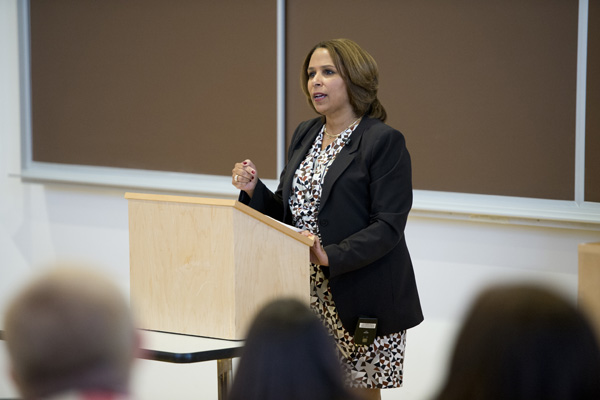The future of equal rights in America

In the 20th century, lawyers played a crucial role in helping secure basic rights for African Americans, women, and others through lawsuits, advocacy, and perseverance, according to public interest attorney Sharon Eubanks.
In the 21st century, however, Eubanks said this work will require lawyers to forge strategic partnerships with those outside their profession to meet new challenges, from changes in the law to the evolving dynamics of information flow in the digital age.
“In today’s world to advance equality for all, actions can’t take place only in litigation. There must be other forms of advocacy,” Eubanks said Monday during a public lecture to more than 100 Northeastern School of Law students, faculty, and staff in Dockser Hall. “We as litigators will find benefits in coordinating with advocacy groups who identify the best causes to move the law toward recognition of equality.”
The role of journalists in shedding light on legal issues will be also be more important than ever before, Eubanks added, as will the use of social media.
Eubanks’ lecture, titled “Representing the Underrepresented: Civil Rights in the 21st Century,” is part of her three-day campus visit and is sponsored by the Daynard Public Interest Visiting Fellows Program, which brings two distinguished public interest practitioners to campus each academic year. The fellows serve as role models for students, demonstrating how legal skills can be used effectively and creatively to make the world a better place. University Distinguished Professor of Law Richard A. Daynard, president of the law school’s Public Health Advocacy Institute, and his wife, Carol, established the program in 2004.

Eubanks gave a public lecture to more than 100 Northeastern law students, faculty, and staff in Dockser Hall on Monday.
On Wednesday at noon, Eubanks will take part in a roundtable discussion on the topic of private impact legislation.
Eubanks is a founding partner of the public interest law firm Edwards & Eubanks. She previously spent 22 years as an attorney in the U.S. Department of Justice’s civil division, where she served as lead counsel in the largest civil Racketeer Influenced and Corrupt Organizations enforcement action ever filed, United States v. Philip Morris. Following a nine-month trial, the federal district court found that defendants—major U.S. cigarette companies—committed fraud on a massive scale and were ordered to change the way they do business, particularly in the areas of marketing and advertising.
Jeremy Paul, dean of the School of Law, welcomed attendees and lauded Eubanks for her esteemed career and accomplishments. “She’s had the career that serves as a role model for anyone preparing for a career in the law,” Paul said.
Eubanks, for her part, noted that the civil rights movement of the 20th century set the stage for many important legal reforms that followed. She cited several public opinion statistics to support her argument, noting that, between 1944 and 1963, the percentage of whites who felt blacks should have an equal opportunity to get a job doubled from 42 percent to 84 percent.
“The law follows public opinion sometimes. This growing popularity of nondiscrimination brought civil rights to the front of the bus, if you will,” Eubanks said, pointing to the passage of the landmark Civil Rights Act of 1964 that prohibited employment discrimination on the basis of race, color, religion, sex, or national origin.
Eubanks also singled out the legacy of the late Thurgood Marshall, who successfully argued the Brown v. Board of Education of Topeka case before the U.S. Supreme Court that led to the desegregation of public schools. He was appointed the first African-American to serve on the nation’s highest court.
“Most of us don’t think of lawyers as being particularly courageous,” she said. “But make no mistake: there were many courageous lawyers who brought us to many of the civil rights that we all enjoy today.”





